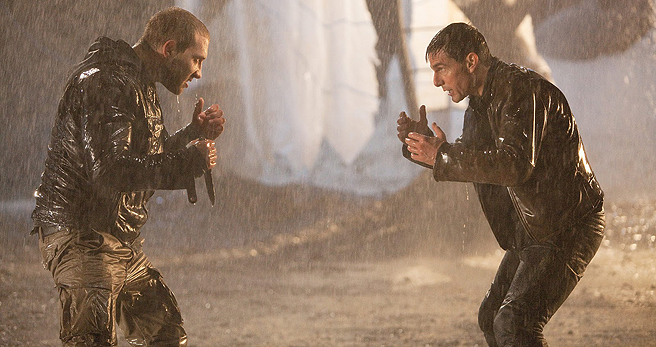
I’ve been trying to figure something out. Thrillers. More precisely, why they don’t thrill me enough. Or rather, yes, they thrill me but don’t satisfy me. So I’ve been pondering the reasons for that.
Is it my fault or theirs? It could be mine. I mean, they really are page-turners, most of them. But often what happens is that around page 216, I lose interest. Which is odd, really, considering that it’s precisely the point where the tension is ramped up, the hero’s in real trouble, and the perpetrator / villain / psychopath is about to be discovered. But at that point, I stop caring.
Let me take a couple of examples. No Time For Goodbye by Linwood Barclay and Live to Tell by Lisa Gardner. Gripping situations, both of them, and despite the differences, a similar starting point. Barclay’s book has Cynthia waking in the morning to find her family missing. Gardner’s has Danielle waking in the night to find her family dead.
Now, both these books are bestsellers. They both have 46 chapters of 3 to 4 pages, with the reader left, maybe not always hanging over a cliff, but at least suspended somewhere in mid-air. So in that respect they work. You turn the pages. And yet, after a while, they don’t thrill.
My first thought was, it’s the characters. The first person narrator of Barclay’s book displays all the complexity of a wooden marionette. While after reading Live To Tell, I knew nothing of Gardner’s detective heroine other than that she eats a lot and would really like to get laid.
But of course we don’t go to genre fiction for psychological depth. If we did, Ian Fleming would never have had the success he did. Nor James Patterson today. So I’ve reached a much simpler conclusion: these books are too long. If they ended on page 215, that would be fine. Why the extra 180 pages? I suspect it’s the Hollywood syndrome: the fight goes on a full 20 minutes, Tom Cruise finally knocks the baddy down and then – groan – the baddy’s up on his feet again and we’re into extra time. Maybe it’s a ploy to keep technicians and stuntmen in work, but to the viewer / reader it’s like being force fed when you already want to throw up.
Now Patterson, I can handle, because he knows when to stop (just before I get bored), but in a book 400 pages or more, I want characters that surprise me, intrigue me, characters who reveal a little of what it means to be human.
You might dismiss what I’m saying here as unreasonable. ‘What does he expect? It’s Linwood Barclay, not Dostoyevsky.’ Sure. I get that. It’s just that if I’m in for a marathon read, I need my interest to be sustained. And Dostoyevsky does that, Barclay doesn’t.
Or else you could say it’s sour grapes. ‘He’s griping because he’d really like to do what they do but he can’t.’ And actually, I confess you’d be closer the mark there. Not quite sour grapes, though, because otherwise I’d include Patterson in the gripe. I probably would have if I’d read him back when I was snooty, but now that I’ve seen what it takes, I begrudge no author their success. My attitude now is they must be doing something right, even if it’s just the marketing.
Imitation isn’t the way, I know. Nonetheless, given that I’m no Dostoyevsky myself, whenever I read Patterson (not that often in fact – maybe half a dozen so far), I go into analytical mode. Short chapters – yep, I can do that. Paragraphs, sentences, words – keep ’em simple and direct. And the book itself – to be devoured in about the same time as a chocolate Magnum. It takes a little practice, but all of that I can manage. Where I’ll always trip up, though, is with the characters. They will insist on having foibles, issues, qualms, dilemmas, contradictions. Why can’t they just be simple? Eat, go after the baddy and get laid. Isn’t that what life’s all about?